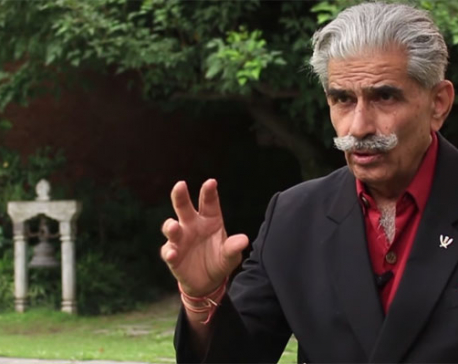
OR


Kamal Dev Bhattarai
The author is editor of www.hakahakionline.com, operated by Nepal Forum of Environmental Journalists (NEFEJ). He writes on foreign policy, media and development issuesnews@myrepublica.com
Apart from reaching out to China and India, the government should enhance relation with Western as well as Middle Eastern countries
Prime Minister KP Sharma Oli first visited India before he went to China. The actual outcome of both the visits: Reiteration on implementation of past agreements signed. PM Oli himself has projected these two visits as major foreign policy accomplishment of his government.
He has claimed that relations with India and China have become more ‘cordial’ and reached a ‘new height’ as if there is not much left to do on foreign policy matters. This clearly shows relation with other countries beyond India and China is not under the top priority for new government’s foreign policy.
India-China confined
Not only Oli, all post-1990 prime ministers have heavily invested their time and energy to appease New Delhi and Beijing. It was necessary for them to draw the support from India and China to ascend to power, and ensure government’s longevity. They always wanted to first make sure that political leadership of both countries would provide full support to new government in Kathmandu. But it was not so until the 1990s.
Nepali kings tried to visit as many countries as possible and those visits were instrumental in improving Nepal’s profile in the international arena and seeking more development aids. Monarchy tried to lessen dependence on India by seeking more development aids from other countries. However, successive governments after 1990 adopted more ‘neighborhood centric’ policy with littler priority for other countries in the world.
As a result visiting India and China right after assuming office became the topmost priority for all post-1990 prime ministers. There have been frequent high level visits between Nepal and India and Nepal and China and there have been continuous engagement at various levels with both the neighbors as well. As the leadership in Kathmandu has become more occupied with India and China, it seems, some key areas of foreign policy have been left out of focus or they are receiving very little or no attention. The government of K P Oli does not seem to be any different from its predecessors.
Areas of neglect
Broadly, two areas have been neglected. First, bilateral visits at the top political level between Nepal and its key development partners such as Australia, Japan and European Union countries are almost non-existent. No extra efforts have been made to bring in more assistance and investments from these countries. Likewise, our foreign policy has failed to give due priority to Middle Eastern and Gulf countries where millions of Nepali youths are working.
Our Prime Ministers and ministers rarely pay official visits to these countries. Government has listed 110 countries for the foreign employment. According to official data provided by Department of Foreign Employment more than 1600 Nepalis leave the country daily for foreign employment and most of them go to Gulf countries. Around 639,167 migrant workers left for various countries last fiscal year.
According to official record of Ministry of Foreign Affairs (MoFA), Saudi Arabia hosts the largest number of Nepali migrant workers in the Gulf region. Over 550,000 Nepalis have been working in Saudi Arabia.
At present, there are about 400,000 Nepali migrant workers in Qatar mostly in service and construction sectors, according to MoFA. Kuwait is another important labor destination for Nepalis. Over 60,000 Nepali migrant workers, out of which about 40 percent are women, are currently working in Kuwait. There are over 200,000 Nepali migrant workers in the UAE. Around 20,000 Nepali migrant workers are in Oman and around 25,000 are working in various sectors in Bahrain.
Remittance has sustained our economy. According to Economic Survey of Ministry of Finance, the share of remittance to GDP remained at 18.5 percent in fiscal year 2010/11 which rose to 29.1 percent in fiscal year 2014/15. The ratio of remittance to GDP reached 32 percent in 2015\2016. According to World Bank Migration and Remittance fact book, Nepal holds the third position among the countries receiving the highest proportion of remittance to GDP.
While the number of youths going abroad for employment is increasing every year, there are frequent reports of Nepali workers not being properly treated. Nepalis have become the victims of exploitation, including workplace accidents and cheating by brokers and manpower companies. For instance, Nepali migrant workers who are constructing stadiums for World Cup 2022 are being exploited in Qatar. According to Amnesty International, migrant workers are trapped in debt and exploitation. The phone survey of 414 Nepali migrant workers revealed that 88 percent of them paid fees to agents for their overseas jobs. The fees were, reportedly, so high that majority of them had to borrow more than half the sum from village money lenders, placing them in debt, according to Amnesty International. “More than half of the workers surveyed-53 percent said they received lower monthly salaries than was promised to them by recruitment agents,” says the report.
Embassy of Nepal in Doha registered some five thousand complaints regarding labor issues. One third of those problems were resolved by the Embassy through negotiation and compromise between employers and employees. Nepali migrant workers have been cheated both at home and abroad.
There are hundreds of cases which show that local brokers and agents cheat workers by sending them abroad in tourist visas. Agents collect huge sum of money from gullible workers by promising lucrative jobs abroad, but flee once they get the money. Migrant workers are stuck in difficult situations but little efforts have been made to rescue and bring them back home.
In 2017, Parliamentary Committee on International Relations and Labor Committee had conducted a field study to find out the situation in gulf countries. The committee concluded that human smugglers have a nexus with employees at Department of Labor. The study showed that many workers who reached gulf countries through illegal channels are facing a lot of difficulties. According to reports, around 30,000 Nepali women have illegally made way to Saudi Arabia.
Beyond neighbors
Therefore it is extremely important for the new government to enhance bilateral relations with labor receiving countries so as to quickly resolve the problems facing them. We must go beyond India and China in our foreign policy conduct.
The new government must engage itself with other countries. The goal of ‘prosperity and development’ cannot be achieved only by engaging with and seeking support from India and China. Let us remember that neither India nor China has announced any economic package for Nepal. They have insisted on projects that help them fulfill their strategic interests in Nepal. Neither country seems eager to support peace and prosperity of Nepal. This is why we must also increase our engagement with key bilateral development partners such as America, Australia, UK, Japan and other European countries.
Exchange of high-level visits with these countries is very minimal though they are our development partners. They have done a lot for Nepal and there is huge potential of cooperaying in these countries. The new government, apart from reaching out to China and India, should enhance relations with Western as well as Middle-eastern countries. Peace, stability and development does not come on its own.
The author is editor of www.hakahakionline.com, operated by Nepal Forum of Environmental Journalists (NEFEJ). He writes on foreign policy, media and development issues
devkamal2004@gmail.com
You May Like This

China outrunning India in Nepali politics, India mulling a new strategy
With an unprecedented activeness of China, India seems preparing to counter it. India's Nepal Affairs expert and retired Indian Army... Read More...

Leftist poll win has little to do with India, China: Experts
KATHMANDU, Dec 21: As the leftist parties -- CPN-UML and CPN (Maoist Center) -- prepare to form a new government after... Read More...

UML, Maoist Center for 'equidistance policy' with China and India
KATHMANDU, August 16: Top leaders of the CPN-UML and CPN (Maoist Center) have said that they want to maintain good... Read More...




Just In
- Fixing a win by outlawing dissent damages democracy
- MoHP cautions docs working in govt hospitals not to work in private ones
- Over 400,000 tourists visited Mustang by road last year
- 19 hydropower projects to be showcased at investment summit
- Global oil and gold prices surge as Israel retaliates against Iran
- Sajha Yatayat cancels CEO appointment process for lack of candidates
- Govt padlocks Nepal Scouts’ property illegally occupied by NC lawmaker Deepak Khadka
- FWEAN meets with President Paudel to solicit support for women entrepreneurship







_20220508065243.jpg)





Leave A Comment